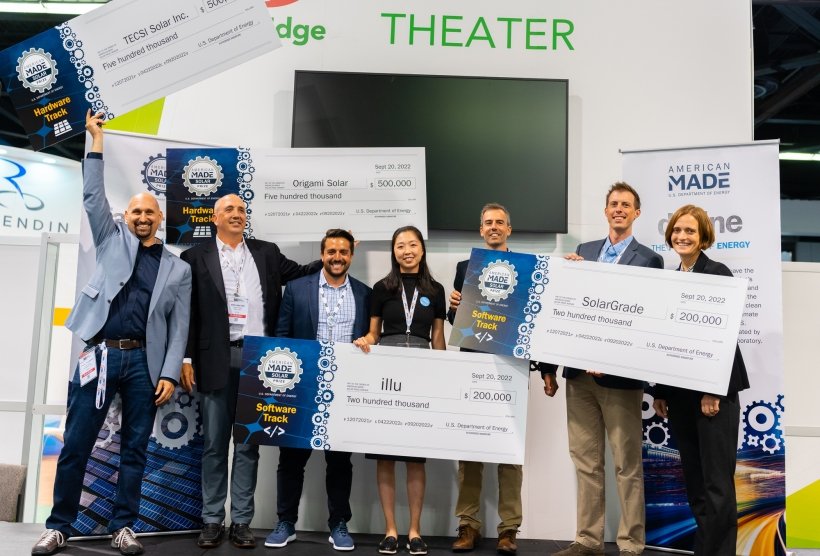
The US Department of Energy (DOE) has announced the winners of its American-Made Solar Prize Round 5, which is a multimillion dollar competition designed to advance hardware and software solar technologies.
Two teams each bagged US$500,000 for their early-stage hardware prototypes, two teams each received US$200,000 for their software innovations and an additional software team received US$100,000 for its role in expanding solar access to underserved communities.
For the hardware track, the two winners were TECSI Solar and Origami Solar. TESCI won for its ‘all in one’ residential solar module, Solvari SR, that simplifies the ordering and installation process by combining the racking, flashing, hardware and power electronics into a single product. It also eliminated the panels’ aluminium frame, reducing emissions from the product.
Origami Solar won funding for its roll-formed steel frames for PV modules that lower the carbon emissions associated with making the frames and reduce PV system costs. The company released details in August that showed how its steel frame outperformed aluminium frames in testing performed by winning counterpart TESCI Solar.
“Origami Solar’s innovation allows solar module manufacturers to lower costs while protecting against supply chain disruptions and enable the energy transition by facilitating domestic ramp-up of module production,” the company said following its win, with its CEO Gregg Patterson adding: “Our steel frame designs and worldwide group of steel suppliers are uniquely able to deliver and scale this transformational solution now.”
On the software side, the winners were HelioVolta for its management platform SolarGrade, illu for its software tools for operations and maintenance (O&M) and Midday Tech, which won the Justice, Equity, Diversity, and Inclusion (JEDI) Prize for its rooftop solar access platform in underserved communities.
HelioVolta won for its cloud-based platform, SolarGrade, that standardises and automates solar and storage fieldwork with easy-to-use mobile and desktop applications. “We built SolarGrade to empower solar professionals like ourselves, who have high standards for quality, safety and performance but are under immense pressure to reduce costs and save time in a fiercely competitive market,” said David Penalva, co-Founder of HelioVolta.
The company will use the prize money to expand its team and accelerate software development efforts as well as quadrupling the existing SolarGrade user base by 2024 through expanding its value proposition and implementing new features that support fieldwork across the full solar project lifecycle, the company said in a statement.
Software company illu won the prize for its mobile and desktop tool for O&M workflow management that will assist field technicians and simplify distributed solar maintenance, the DOE said.
The winner of the JEDI prize, Midday Tech, is building a platform to connect consumers who purchase voluntary carbon offsets with high-impact rooftop solar projects in underserved communities. It was one of three winners from the last stage of the competition and will go home with US$100,000 for its role in expanding access to neglected communities.
“DOE is committed to establishing U.S. leadership in solar manufacturing, and that means investing in the entrepreneurs with game-changing ideas to solve our biggest challenges,” said Alejandro Moreno, acting assistant secretary for Energy Efficiency and Renewable Energy.
“The American-Made Solar Prize Round 5 winners are powering us closer to a clean energy future with their exciting new hardware and software technologies.”
The American-Made Solar Prize is administered by the National Renewable Energy Laboratory and is funded by the DOE Solar Energy Technologies Office (SETO), which recently spoke with PV Tech about its post-Inflation Reduction Act (IRA) strategy.
Both tracks had 10 finalists each and were announced in April. At the time, each hardware finalist received US$100,000 in cash prizes and US$75,000 in vouchers to advance their innovation from proof-of-concept to prototype in the final contest, while the software track finalists received US$60,000 each.
